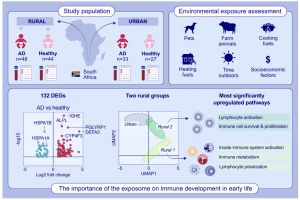In a recent paper, researchers have described the significant impact of early-life environment on children’s immune system development, highlighting how rural upbringing and outdoor exposure to animals contribute to a more finely tuned immune response compared to urban environments.

Graphical abstract: This study examines the molecular mechanisms and environment exposures underpinning the rural/urban immunological gradient in South African children with or without AD. Differences in animal exposures, home fuel use, time spent outdoors, and socioeconomic factors associated with differences in immune gene expression. One hundred and thirty-two DEGs were observed in children with AD (including IGHE). UMAP clustering identified one urban and two rural groups characterized by differences in both lymphocyte and innate immune cell processes. AD, atopic dermatitis; ALPL, alkaline phosphatase; CYP4F3, cytochrome P450 family 4 subfamily F member 3; DEFA3, defensin alpha 3; DEGs, differentially expressed genes; HSPA1A, heat shock protein family A (Hsp70) member 1A; HSPA1B, heat shock protein family A (Hsp70) member 1B; IGHE, immunoglobulin heavy chain constant epsilon; PGLYRP1, peptidoglycan recognition protein 1; UMAP, Uniform Manifold Approximation and Projection for Dimension Reduction (Lunjani, et al. 2023).
The study underscores the vital role of a child’s living environment and lifestyle in shaping their immune system’s regulation. It emphasizes that during early life, the immune system learns to moderate its responses to prevent hyperactive reactions later in life that can lead to various diseases.
Focusing on South African children aged 15 to 35 months living in rural and urban areas, the study investigated the relationship between environmental factors and the presence of atopic dermatitis (AD) or eczema. Children from rural backgrounds exhibited immune systems equipped with diverse mechanisms to identify and manage threats. Notably, the study found that various immune pathways are formed in response to beneficial early-life exposures like outdoor activities and animal interaction, as well as potential negative exposures such as pollutants and viral infections. This research unveils that pivotal environmental factors are closely linked to the alteration of microbial exposure during a child’s early years—a critical phase for shaping the immune system’s responsiveness to environmental elements including infections, nutrition, and microbiome.
By shedding light on the factors that contribute to a well-regulated immune system, this study paves the way for understanding and potentially mitigating the risk of immune-related ailments.
Journal reference: Lunjani, N., et al. 2023. Rural and urban exposures shape early life immune development in South African children with atopic dermatitis and nonallergic children. Allergy.
Summary by Stefan Botha










